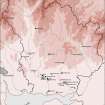Mossknowe
Hogback Stone (Early Medieval)
Site Name Mossknowe
Classification Hogback Stone (Early Medieval)
Alternative Name(s) Mossknow; Mossknowe House; Mossknowe Hogback
Canmore ID 95197
Site Number NY26NE 28
NGR NY 2812 6971
NGR Description NY c. 281 697
Datum OSGB36 - NGR
Permalink http://canmore.org.uk/site/95197
- Council Dumfries And Galloway
- Parish Kirkpatrick-fleming
- Former Region Dumfries And Galloway
- Former District Annandale And Eskdale
- Former County Dumfries-shire
Mossknowe, Dumfriesshire: hogback grave-cover
Measurements: L 0.61m, W 0.27m-0.33m, H 0.19-0.24m
Stone type: pink sandstone
Place of discovery: NY c 281697
Present location: Dumfries Burgh Museum.
Evidence for discovery: found between 1900 and 1910 in the garden at Mossknowe during drain digging. It was used as a step until it was taken to Dumfries Museum.
Present condition: truncated at both ends and worn.
Description
The stone tapers towards each end, and a wide band of interlace has been carved along the crest. Side A has been carved with four plain clinker bands and side B with a medallion scroll with pointed leaves and single large berries.
Date: tenth century.
References: RCAHMS 1920, no 377; Lang 1974, 219, 229-30; RCAHMS 1997, no 1776, 255.
Desk-based information compiled by A Ritchie 2019.
Field Visit (1 October 1912)
NY26NE 28 c. 281 697
In the garden at Mossknow [NY26NE 26.00] there lies the central portion of a hogback measuring 2 ft [0.61m] in length, 10 ins [0.25m] in depth and 1 ft [0.3m] in breadth at base. It is carved on one side with interlaced ornament formed of two intertwining cords from which proceed short divergent branches terminating either in discs or barbed points. The other side is divided by incised lines into four horizontal bands. Along the crest is an ornament formed of three interlacing cords. The stone was found recently while a drain was being dug at the bottom of the garden.
Visited by RCAHMS 1 October 1912
Reference (1968)
The Mossknowe Hogback (decorated with modified tegulae, 4-cord plait and debased vine scroll) has been deposited on loan in Dumfries Museum.
J Williams 1968.
Reference (1975)
This hogback is held in Dumfries Burgh Museum. It was found during ditching operations at the foot of a garden in Mossknow between 1900 and 1910, and until recently served as a step. The ends are lost and it is of pink sandstone; it is of eccentric type and is attributed to the 10th century. Length 61.0cm; width at ends (broken) 27.0cm; width at crown 33.0cm; height at ends 20.0 and 19.0cm; height at crown 24.5cm. Both ends are lost but the bombe lines are noticeable. The broad ridge is 11.5cm wide at the centre tapering to 10.0cm at the ends and is decorated with a bold run of interlace in bevelled band, 2.3cm wide, in fairly high relief. It consists of interlocked figure-of-eight elements with elliptical terminations, arranged so that the intersections and terminations occur within the ellipses.
Side A: There are four unornamented clinker bands, each 5.0cm deep, seperated by incised lines and with a very slight overhang. There is some vertical hatching and the surface is pitted in places, but there is no tegulation.
Side B: The side carries a well-cut late figure-of-eight vinescroll in bevelled band 1.7cm wide. It terminates at one end and is 13.0cm deep at its centre. It consists of two main stems which remain seperate at the terminal end and which interlace so as to form vesicas containing off-shoots which cross and terminate either in arrow head leaves or discs, 3.5cm in diameter. Similar off-shoots curl from the outside of the main stems, their arrowhead terminals pointing inwards to the intersections, although at the more defective end they form scroll lappets, like one of the interior off-shoots. At the terminal end there is a worn raised area, 6.5cm long and 5.5cm, joining the vinescroll to the broken end of the stone.
Below the ornamented roof pitches are plain plinths, on side A almost vertical and 6.5cm deep, on side B 6.0cm deep and inclined inwards towards the base.
J T Lang 1975.
External Reference (25 March 1996)
This hogback stone is held in Dumfries Museum under accession number DUMFM 1968.91.
Information from Mrs S Ratchford (DUMFM), 25 March 1996.
Reference (1997)
Listed as Mossknowe, hogback gravestone.
RCAHMS 1997; Riddell MSS 581, 28-9.












